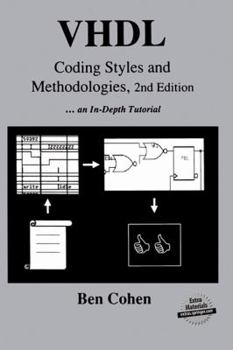VHDL Coding Styles and Methodologies
Select Format
Select Condition 
Book Overview
VHDL Coding Styles and Methodologies, Edition is a follow up book to the first edition of same book and to VHDL Answers to Frequently Asked Questions, first and second editions. This book was originally written as a teaching tool for a VHDL training course. The author began writing the book because he could not find a practical and easy to read book that gave in depth coverage of both, the language and coding methodologies. This edition provides practical information on reusable software methodologies for the design of bus functional models for testbenches. It also provides guidelines in the use of VHDL for synthesis. All VHDL code described in the book is on a companion CD. The CD also includes the GNU toolsuite with EMACS language sensitive editor (with VHDL, Verilog, and other language templates), and TSHELL tools that emulate a Unix shell. Model Technology graciously included a timed evaluation version of ModelSim, a recognized industry standard VHDL/Verilog compiler and simulator that supports easy viewing of the models under analysis, along with many debug features. In addition, Synplicity included a timed version of Synplify, a very efficient, user friendly and easy to use FPGA synthesis tool. Synplify provides a user both the RTL and gate level views of the synthesized model, and a performance report of the design. Optimization mechanisms are provided in the tool.
Format:Hardcover
Language:English
ISBN:0792384741
ISBN13:9780792384748
Release Date:March 1999
Publisher:Springer
Length:455 Pages
Weight:2.55 lbs.
Dimensions:1.2" x 7.2" x 10.3"
Related Subjects
Architecture CAD Computer Science Computers Computers & Technology Drafting & Presentation Education & Reference Electrical & Electronic Engineering Electrical & Electronics Engineering Graphic Design Languages & Tools Methodology Programming Programming Languages Software Engineering Systems Analysis & Design TechnologyCustomer Reviews
5 ratings
No other book needed
Published by Thriftbooks.com User , 21 years ago
This is the best of 4 books I purchased on the subject of VHDL, by a factor of 10. The price took me by surprise but it was readily available through the third party link. Buy this one and you won't need any of the others. If I would have purchased this one a year ago it would have saved me much grief.
A good reference book you will consult again and again
Published by Thriftbooks.com User , 21 years ago
This is a very good reference book for checking coding styles and syntax for VHDL. There are several books that teach the basics of how to write VHDL code, but this book shows you best practices for doing a good design in your projects. This book is a must have for anyone who wants to become a proficient VHDL designer who can produce quality designs.
What a book!
Published by Thriftbooks.com User , 23 years ago
This book has just become my number one book to recommend to the students of the VHDL classes that I teach. It is very well written and the book is loaded with VHDL examples demonstrating the various constructs, statements and issues. In example 5.5.1.2, the author does the best job I have ever seen of explaining the difficult subject of "Projected Output". The subjects are frequently associated to the specifications found in the Language Reference Manual. When there is a linking issue between two or more design elements, the linking is clearly demonstrated with examples. The only negative is that the author spends far too much time and book space describing ways to "Enhance Readibility" or documenting your design--which is always a personal preference. But still, a five star book.
Excelent Book
Published by Thriftbooks.com User , 23 years ago
An indispensable book. He gets your mind thinking in VHDL coding. Not only in what you write, but how you write it for structure, consistancy and readability. Full of coding examples and test benches for almost every aspect of VHDL including the source code on CD. Ben's ideas for coding styles really gives a consistant look to all my code. Coding he gets into the nuts and bolts of VHDL. Types, arrays, functions, aggregates, cases, generics, packages, concurrent, sequential, parameters formal and actual ..., the rationals explain why and examples examples examples. This book sits with me at all times.
Best practical book I have read yet.
Published by Thriftbooks.com User , 24 years ago
This is an excellent book for the practicing engineer who wants a real world example. The book has many examples of code which will compile and work. In addition it has recommendations on best practices ( 2 thumbs up) and worst practices (2 thumbs down) with a rational for why you would want to follow the recommended practice. It also makes clear distinction between sythesizable code, and behavioral code. Compared with the other books which are heavy on the language semantics (and examples that won't compile) this is a much more usable book. The hardware desiner will find this to be the best book they have.





